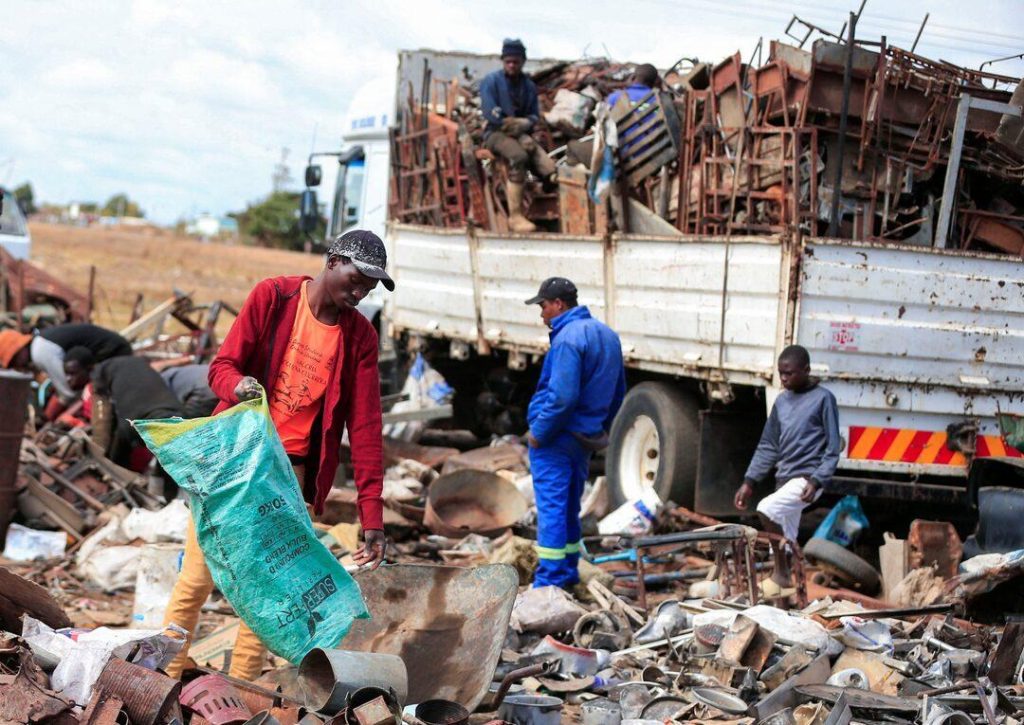Remember this line “Iron condemn” or those northern guys that barter damaged or worn out appliances for buckets and packers or those black charcoaled-looking nomads with pick rods on their hands, magnets attached to a rope, and loose sacks hung on their shoulders scavenging the waste yards for metals or used plastics?
Of course, if you are Nigerian right from childhood you will find it easier to pick these points.
Scrap Business involves the recycling of abandoned, damaged, or used materials into a newer product.
This involves going to all four corners searching and collecting leftover materials, usually from industries, residential and commercial areas; it could be iron, aluminum, copper wires, condemned machinery, and disposed plastics.
These recyclables are then taken to the scrap yard which would be mostly controlled by you, then the recycling companies come to purchase them.
You now know where all those waste pickers are going with what they scavenged. Funny enough, we look at them as wretched and poverty-stricken, though that’s how they want us to see them. You don’t expect to be in suits scavenging.
And to tell the truth, they earn a lot especially when they sell in good tonnage, but not as immensely as the scrap yard owner.
Let’s take a quick look at some guides to starting a scrap business in Nigeria and how you can join the bandwagon.
Table of Contents
How Does Scrap Business Work in Nigeria.
Scrap Business is the process of collecting dormant or abandoned materials that were once useful but dumped due to damage or wear. These leftover materials are usually from Industries, manufacturing companies, and residential areas. Examples include iron, steel, aluminum, copper wires, worn-out appliances, condemned machinery, and used plastics.
After these wastes are collected, they are taken to the waste yard for compressing, decoupling, and sorting the useful parts, then they are sold to the scrap recycling companies where they are melted and transformed into various products.
You will need to decide if you want to own the recycling factory or be the intermediary between the waste pickers and the recycling companies where you handle the sorting and selling.
Types of Scrap Business in Nigeria.
There is quite a mountain of scrap businesses in Nigeria, all with their profit potential. Let’s take a pick at some.
#Metal scraps
- Ferrous metals(magnetic): iron and steel are the commonly used scrap metals and of lesser value unless they have a good tonnage(more quantity).
scrap materials: old cars and appliances, beams, rods, damaged farming equipment, and steel pipes among others.
- Non-ferrous metals(non-magnetic): aluminum, brass, tin, copper wires, bronze, and lead. Non-magnetic metals are known for their sumptuous price in the scrap market, though not all of them are easy to get, aluminum, copper wires, and tin cans are still commonplace.
Srap materials: Aluminium cans, Copper wire, window frames, kitchen utensils, roofing materials, radiators, and so on.
#Non-metal scraps
- Nylon, Glass, Plastics, rubber, tires, paper, batteries, electronic waste(computers, touch lights, radios), and medical scraps(syringes, gloves, bottles), to mention a few.
How Profitable is Scrap Business in Nigeria
The recycling of scrap materials has greatly reduced the cost of manufacturing, by reducing the amount of raw materials needed. As Nigeria moves to pursue a sustainable environment, recycling scrap materials is a more efficient way of saving energy, and resources and reducing environmental pollution. This has prompted the demand for scrap materials, hence a profitable venture for those interested in the business.
One interesting fact about the scrap business is that the bulk of these waste materials are acquired at no cost, they are found littered on the street, and residents even beg for them to be hauled. You can even go to an advanced level by purchasing, at a minimal price, bigger scrap materials such as condemned machinery and cars or damaged appliances.
Some people will even beg and pay you to trash these wastes–if only they knew they were enriching you!
Recommendation: 10 Business Risks in Nigeria: Understanding the Critical Drivers to Your Business Success
Steps to Start Your Own Scrap Business in Nigeria.
Businesses require a lot of planning and understanding of the industry. You can’t jump into things and run them anyhow you fancy; that’s why we are here to sail you through. Now here are steps to start your own scrap business in Nigeria.
#Determine the kind of Scrap Business that you Fancy
You must determine the kind of scrap business you are comfortable with whether metal or nonmetal scrap or electronic wastes. After that, you research the market demand for the specific type of scrap you intend to go into. This will help you understand the supply and demand dynamics, variations in prices, and potential customers.
#Determine the Amount you are Willing to Invest
You must determine how much money you are willing to invest in the scrap business. The kind of scrap business solely depends on the amount of resources you have. You need to factor in the cost of acquiring land or space for your scrap yard, the cost of tools and machinery, the cost of paying employees, taxes, insurance, and more. You can save costs by purchasing only the necessary things you need to get the business up and running.
#Craft a Plan for your Scrap Business
Take your pen and outline all the processes that you think will push your business to success. This includes what you plan to achieve with the business, the amount you think will be enough to cover expenses, the challenges you could encounter and how to overcome the plans for possible expansion, the number of employees you will need, target customers, where and how you can locate them, the list goes on.
#Know What Your Customers Want
There are lots of scrap businesses out there. Not all will be in demand so it is crucial to do your research to determine what types of scrap are highly in demand in your area of operation. For example, if your nearest high-paying customers are into steel rolling or melting business it would be out of place to focus more on iron and aluminum. That’s why it’s important to research the current demand and base your business around the demand.
#Source for Scrap Materials
Your major target for scrap materials includes manufacturing companies like steel rolling and bottling industries Also, you can source scrap from construction companies; when buildings are built, demolished, or remodeled there must be leftover scrap materials such as pieces of beam, rods, aluminum sheets, cement sacks, etc.
You can get in contact with technicians, and mechanics for any condemned appliances or machinery they intend to sell and buy them at a cheaper price. You can even launch a trade by barter fare for the exchange of household scrap for a gift. And finally, you can get in contact with the local waste pickers.
#Purchase the Essentials for your Business.
Essentials include anything you deem could make your scrap business profitable and efficient. In the long run, you will need a durable truck for carrying scraps, tools like a set of screwdrivers, wrenches, blow touch, drills, wire granulators to separate wire from the casing, and a magnet for determining between a ferrous and non-ferrous metal and most importantly, safety gears such as helmet, gloves, and safety boot. Though it’s not important you get everything from the start, you can just purchase the ones you feel are indispensable; as you expand you can procure more
#Get a Scrap Yard if Possible
You will need to set up a scrap yard where you can hold all the recyclables for sorting, disassembling, and general safekeeping. The scrap could be as small as an average-sized shop or as large as a warehouse or it could be a vast expanse of land with barricades. It mostly depends on the size and quantity of the recyclables. All in all, you must ensure that the space is accessible to customers and vehicles, conducive, and secured.
#Get the Necessary Paperwork
The next wise thing to do before starting a scrap business is to obtain the necessary permits and licenses so you can operate legally. You can contact the necessary bodies to enquire about the procedures.
#Hire a Team
There is no one-man army in the scrap business, it mostly requires at least two people or more. As you expand you can think of employing more hands, most importantly capable hands that will take care of sourcing for scraps, sorting, and disassembling of scraps. This is not to say you cannot start on your own, but you still have to include at least one person to enhance efficiency and avoid instant burnout.
#Advertise your Scrap Business.
Finally, don’t rely on the word-of-mouth method of promoting your scrap business. Relying on customers to spread the word about your business can be very limiting in terms of reach and growth potential. Most businesses today invest in both traditional and digital advertising to promote their business and to reach a wider audience.
Some of the advertising processes include advertising in the local newspapers, radio, and TV stations making flyers and banners. You can even have a fair where you trade gifts for scrap. Going digital, you take advantage of social media platforms like Facebook, Instagram, Twitter, Google, and the like.
Conclusion
Scrap collection is a very lucrative business in Nigeria, especially at a time when the world is seeking to move to a more sustainable way of manufacturing products without consuming much energy and resources. We need to look past “iron condemn” for us to be able to see the profit potential in this dirt business.



Which of the scrap metal is most profitable and can I start the business with one million naira.